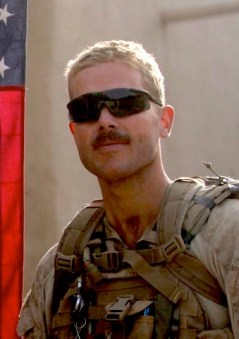Captain Donald Hansen and his grandson, William Treseder, 1985.
Part 3 of 3
I could not believe my good luck when I discovered an opinion editorial written by my grandfather during the height of the Vietnam War. His arguments, informed by years of hardship, outline a practical guide for American statecraft in an increasingly fragmented and competitive globe.
Captain Donald Hansen drew from his experiences to live in a clear-eyed fashion. He was not swayed by sophists on either side of the aisle. His confidence in the basic goodness of the United States — born of exposure to the terrible machinery of the Japanese empire and communist regimes in China and Korea — captures what is so sorely needed now as we confront an array of threats, new and old.
His story is awe-inspiring yet familiar to those of us who grew up in the shadow of the Greatest Generation. A young man, uprooted from his father’s struggling South Dakota auto shop to fly bombers during World War II, Hansen also answered the call during the Korean conflict despite my grandmother’s reservations.
All told, he survived over 150 combat missions, fathered a loving family, enjoyed a rewarding career flying for American Airlines, and then spent three happy decades as a grandfather.
Reading his thoughts, it is easy to forget that the war cut short his education after one year of college. His insights are the condensed wisdom of a man who had seen sacrifice at home and war abroad, let their powerful waves wash over him, and sharpened his mind without losing his heart.
He did not glorify combat: how could anyone who has lived through its tragedy? But neither did the trauma in his early years blind him to its necessity, or to the careful deliberation of its value when measured against the principles and interests of the United States.
My grandfather was neither idealist nor defeatist. The men and women of his generation could not afford to be. They were too busy surviving.
Pragmatism rings in every word of his argument. He does not claim a mantle of perfection for our quirky blend of democratic capitalism. He also did not start down the sad path of viewing the American system of government as no more valuable than its lesser competitors.
There should be no quarter given to states that regularly deny basic freedoms to their citizens. Even our South Korean allies earned his lasting scorn for their brutal treatment of enlisted men.
America’s clunky model may reward a short-term — even opportunistic –mindset, but that is the price we pay for a government that is in a state of continuous renewal. No other method has proven as lasting or as progressive.
It is precisely this democratic churn that keeps us fresh, strengthens our resolve, gives us faith in American systems and people, and ensures we spread its benefits around the world.
Yet we lack the conviction of earlier generations, the ones who labored, who knew true collective sacrifice. It was their maturity that kept the lid on cancerous governance for so many decades. Now many young Americans sit contentedly on the sidelines, waiting for the inevitable outcome, be it good or bad.
How many of us are paralyzed when looking down at the scrambling, clawing reality going on below our lofty perch as the world’s superpower? A short time ago that was us, yet we do not recognize ourselves in its grimy vitality. We cannot imagine the struggle up the mountain.
America’s system requires us to remember this origin, to reclaim the moral imagination needed to build toward a brighter future. Our actions in moments of crisis, such as the extreme financial hardship and inequality facing our country today, are guided by these foundational narratives. The vision and mettle of our leaders will determine the composition of their supporters and the breadth and thrust of policy, codifying both weaknesses and strengths.
Born of hardship, the Greatest Generation viewed such crises as challenges to be overcome, nothing more. They consistently pushed our nation to new heights in industry, science, and technology. After overcoming the Great Depression and World War II, what fear can a budget deficit or immigration reform stir in them?
Where others complain and bellyache, they merely saw the long, dangerous road stretching out ahead of them, assessed its grade and terrain, and — without fanfare — shouldered their pack and marched on.
Such people did not question a basic truth many of us have yet to learn: we cannot rest at the top.
We look back at our history to learn and gain resolve, not criticize. There is so much work to be done if we are to continue this imperfect yet existential march toward realizing America’s founding principles.
The slow evaporation of the Greatest Generation has left America without the pragmatic leadership it desperately needs. Most of our leaders from the succeeding generations are ineffective, masquerading as statesmen while their clammy hands fumble with the compass. They lack the courage to name our true problems, let alone attempt to solve them.
Apologies will not work, senseless wars are not an answer, patriotism will not sustain us. What we need are men and women with practical experience and civic responsibility who can wisely measure reality, blazing trails in pursuit of ever-greater progress.
William Treseder served as a Marine sergeant from 2001 to 2011, deploying to Iraq in 2008, and to Afghanistan in 2010-11. He now works for a defense technology firm in San Francisco, and can be reached at william.treseder@gmail.com.


